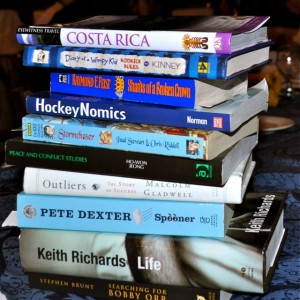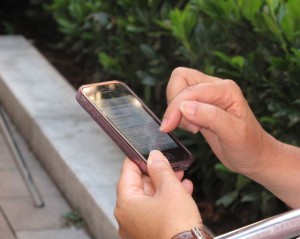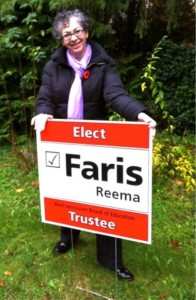Posts Tagged ‘learning’
What’s In A Word?
In 2010, I was accepted into the Graduate Liberal Studies (GLS) program at Simon Fraser University (SFU).
Going back to school, part-time, was one of the best decisions I’ve ever made. In addition to reentering the world of study and immersing myself again in the humanities, my status as a Masters student allowed me to apply for Teaching Assistant (TA) positions at SFU. I’ve been fortunate to serve as a TA in the Department of Humanities for four terms.
I love being a TA. I love attending lectures and brushing up on familiar subjects and topics or delving into new ones. I love the dialogue with students in tutorial — especially on those days when they decide to leap into the discussion — and I love the challenge of trying to figure out how to engage them in texts so that they see how a work that’s centuries old does have relevance to their world today.
And I love playing a role, however small, in helping them develop their writing skills. However, I’m frustrated by the general level of writing I’ve encountered in these courses especially since the participants represent the gamut of undergrad experience, from level one to level five or higher.
It’s more than a question of writing. Although we live in an age of literacy, it seems to me to be a question of reading.
Why?
 Because in a world where information is literally at our fingertips, students do not take the time to search out a reference in a literary work or to look up a word.
Because in a world where information is literally at our fingertips, students do not take the time to search out a reference in a literary work or to look up a word.
A simple check in a dictionary app or online could make all the difference in the interpretation of a passage from a primary document or a novel or a philosophical treatise.
A simple Google search can tell you more than you’d ever need to know about a name or time which adds layers of meaning to assessing an author’s intent or understanding a character.
And I find that I can pick out the words which students will most likely not have understood or not have taken the time to investigate, with eerie accuracy, even if they are what I would consider simple words for someone studying at the post-secondary level.
The latest such word was “pious”.
The professor I’m working with this term used the word during his lecture. He was talking about characters or figures who, albeit pious, face serious consequences in their lives. That is, the tragedies with which they contend are not a reflection of their personal morality, but are often a reflection of their time and the socio-cultural values of their societies. That’s a much more sophisticated analysis than saying they were “bad” or “unlucky”.
What’s in a word?
The world is in a word.
A world of meaning is embedded in a word, a world of interpretation, a world of understanding.
Words by the Bee Gees (1968)
You think that I don’t even mean
A single word I say
It’s only words and words are all I have
To take your heart away
Crazy Little Thing Called Twitter And The FSAs
At first I lurked.
I’d log on to Twitter.com and scroll through the streams, fascinated.
I started to tweet in support of my campaign during the 2011 civic election and now it’s part of my daily routine.
With Twitter, I keep an eye on my community. I get news from around the world. I read analyses of issues and events from different perspectives. I interact with well-known figures and people in faraway places, opportunities I may never have had otherwise.
Twitter is also ugly at times, “nasty, brutish, and short” in the words of Thomas Hobbes. And while it is liberating to talk to so many so easily, Twitter is also constraining.
Why?
My Twitter account is a mirror of who I am as a whole person, but that whole person includes being a public figure. I have to be aware that although I am speaking personally, some may mistakenly take my views as those of the West Vancouver Board of Education. I have to be aware that while I distinguish between the different hats I wear in life and the various roles I play, others may not.

Which brings me to the Foundation Skills Assessment (FSAs), a test administered to Grade 4 and Grade 7 students throughout British Columbia.
Twitter streams were on fire about the FSAs recently, but I kept mum. I felt that whatever I said in 140 characters could be mischaracterized.
Here’s some of what I wanted to say.
As a parent, I had no objection to my child writing the FSA. As a Trustee, I see value in the data collected because it can be used to align resources with demonstrated need.
Here’s the problem: what we want the FSA to do and what is done with the FSA results have diverged.
FSA data, in addition to use by the provincial government and by school districts, is used by a third-party organization to rank schools.
The Fraser Institute rankings are myopic: they claim to present an overall picture of a school, but the rankings seem to be unduly weighted on one factor, FSA scores.
Rather than the FSA, why not invest in developing literacy screeners for key grades, the results of which would be privately held and exclusively used by the school, the district, and the student’s family? I’m thinking of something like the early literacy screening used for kindergarten students in West Vancouver.
And while I acknowledge that provincial measures are needed for accountability purposes, perhaps a better method of tracking student performance could be determined through a consultative process with key partner groups.
Perhaps by separating the two requirements — diagnostic and reporting — and by creating mechanisms for each, we would be spared the yearly rankling spectacle of school rankings.
At our January public board meeting, Sandra-Lynn Shortall, District Principal – Early Learning, paraphrased a conversation she’d had with Dr. Stuart Shanker. “Early intervention,” she said, “is not the answer to helping students address their needs, rather it’s continuous intervention and connectedness.”
Just as Twitter is not always the best mode of communication, the FSA may not be the best mechanism to match vulnerable or struggling students with the continuing supports they need to succeed in our public education system.
I think we can do better.
Year One Retrospective
A year ago, I was elected as a Trustee to the West Vancouver Board of Education and it’s been an honour to work on behalf of this community. I’ve lived most of my life here, I’m a graduate of the school district in which I now play a role, and I’m fortunate I’m able to raise my child here.
As a public education community, we’re very lucky in West Vancouver. We have a great administrative team, we have inspiring leadership from our Superintendent, we have incredible staff, we have a caring Board, and we have a cadre of educators who are diligent, dedicated, and determined to deliver the highest quality teaching and learning.
We’re also favoured in that our community highly values education and families here generally have the means to ensure the best for their children. And yet, even with all these advantages, I see any number of troubling issues which appear to characterize the public education system in British Columbia.
And so, when I’m asked about my experience as a Trustee, my inclination is to say that the system is more complex and complicated than I realized despite having been an active parent-volunteer for five years before choosing to run for office.
Why?
In part, I think, because there are many different interpretations of the generally agreed upon underlying principle which I see as “the best interest of the child”.
Is the core purpose of education the success of the individual child or is it the betterment of society? Do parents know what’s best for their child or do teachers? Is an educator an autonomous professional or an expert member of a team?
I’m sure any one of us could generate an endless list of questions on the big picture of education, but then there are the practicalities. How is the provincial government able to show that funding per pupil is at an all time high while school districts have to nip, tuck, or cut programs and services in order to balance budgets? Given that 80% of a school district’s budget is consumed by salaries and benefits, how can innovative projects be implemented when resources are so constrained? How can infrastructure be maintained and new capital projects be contemplated with no additional funding?
Despite the seemingly intractable challenges, there’s no doubt in my mind that we have to do everything we can to foster dialogue on this issue. That education needs to be made the highest priority in this province, that we have to find a way to work collaboratively to make our strong system better.
The reason is simple. Education is the path to a more just and more equitable world.
And while it may be difficult to hold on to this truth given the evidence of the harm humans continue to do to the earth and to each other, it is why I remain committed to doing the best I can, for public education, in the remaining two years of my term.
Is Mean Really What It Takes?
I’m a Gleek, a fan of the television show Glee. It first aired in 2009 and although I fell off as a spectator last year, I’ve picked up the habit again for Season 4.
Britney 2.0, the most recent episode, aired last Thursday. Incorporating music by Britney Spears, for the second time in the show’s history, and tracing the development of a key character, the episode also alluded to the real life trauma, the very real events in the public roller coaster ride of Ms. Spears’s celebrity existence.
But that’s not what I want to talk about.
Another story line this year follows Rachel who has moved to New York to attend a prestigious performing arts academy in the Big Apple.
Rachel’s dance teacher is Cassandra July, played brilliantly by actor Kate Hudson. With a predictable coulda-been-a-star background, Cassandra’s teaching style is abrasive and vindictive. To move the plot along, as you might expect, her scapegoat is Rachel, the young woman from the small town with the big dreams of making it on Broadway.
At one point in the Britney 2.0 episode, Cassandra says, “I pick on my students because I want them to be ready for that.” That being the difficult and rejection-filled life of being a musical theatre professional.
The show reflects the mindset that what doesn’t break you makes you stronger. I find this sentiment abhorrent.
Why?
Because it justifies meanness. It rationalizes the abuse of power. It embodies a stereotype of the cruel authority figure whose behaviour is sanctioned as being for one’s own good.
There may be individuals who thrive under such a system and there are those who are motivated by an I’ll-show-’em bravado. Most of us, I conjecture, wilt if we’re starved of encouragement and trampled under the weight of another person’s ego.
Many of us likely carry such hurts already.
Being mean is not the same as being constructive. Being mean is often destructive. And there can be nothing worse than when that meanness comes from those whom we admire whether our parents, our siblings, our family members, our friends, our colleagues, our coaches, our mentors, or our teachers.
Education is not coercion nor compulsion. Learning does not come about when you harp on weaknesses or failures or transgressions.
While I obviously cannot say how the season of Glee will unfold, I’ve watched enough American television and enough American films to predict that at some point Rachel will thank Cassandra July for challenging her, for being so mean.
Rachel will acknowledge that Cassandra made her dig deep, overcome crushing criticism — if not outright belittlement– and helped her take those crucial steps along that yellow brick road to making her dreams come true.
This portrayal perpetuates a stereotype of what it takes to be successful, but even more damaging in my mind is the stereotype it perpetuates of the tough-love teacher.
And that’s a stereotype it’s time for us to break even if it’s only on television.
Expectations
There are essays to mark yet and a final exam to invigilate, but as of today I’ve wrapped up my second term as a Teaching Assistant (TA) in the Department of Humanities at Simon Fraser University (SFU).
Here are some key insights I’ve gained through this experience:
- I enjoy teaching at the post-secondary undergraduate level.
- I love the Humanities.
- I feel a special affinity to SFU and particularly the Burnaby campus.
My enjoyment has come from the interaction with students in an environment which encourages discussion. And there have been many ideas to discuss! Our texts this term ranged from the Greek tragedy Antigone by Sophocles to Plato’s Apology to the medieval French chanson de geste, The Song of Roland, to The Prince by Machiavelli, to the slave narratives by Frederick Douglass and Harriet Jacobs and the contemporary play Copenhagen by Michael Frayn.
This literary selection speaks to me of the breadth of the human experience, the vast scope of history, and the value of the big picture. It’s also about connection from one era to the next, from the people of yesterday to those we share the world with today. Machiavelli, for example, talks about political power and while our context is radically different from 16th century Italy, when we try to understand recent Canadian political scandals such as the Robocall affair or the F-35 fiasco, are we not considering some of the very same principles he explored in his writing?

It may be depressing to think that with all of humanity’s progress, human beings and human nature seem to remain stubbornly the same. Perhaps, on the other hand, there is reason to be optimistic since the study of texts such as these validate and reaffirm our human existence. We have a place in this world and we have the ability to expand and enhance our understanding of who we are. Study in this area helps us see the connection to where we’ve come from and perhaps will help us carve out a better path to where we hope to be.
Here’s something else I’ve decided based on my experience at the university. Education in K to 12 is due for an overhaul. We see this “renaissance” starting in the inquiry-based pedagogical approach that is taking hold and in the support initiatives which recognize the needs of the whole child such as self-regulation. But systematic change is needed.
And we need to make sure that students know how to ask questions and establish their own expectations around their learning experiences.
Why?
Each term, I’ve started off my tutorials asking students to identify the expectations and the concerns they have regarding the course. While they seem to have no difficulty in listing their concerns — the amount of reading, the writing load, marks, and so forth — they seem unable to verbalize their expectations.
Is this perhaps because the system has always told them what to expect and what their learning outcomes ought to be? Have we failed to inculcate our students with the ability to independently identify what the purpose of learning is or what their optimal learning experience may look like?
It seems to me that at the very least an undergraduate should be able to say, “I expect to learn.”
And if I can play a part in that learning, then I think, after years of searching, I may just have found my life’s passion.

